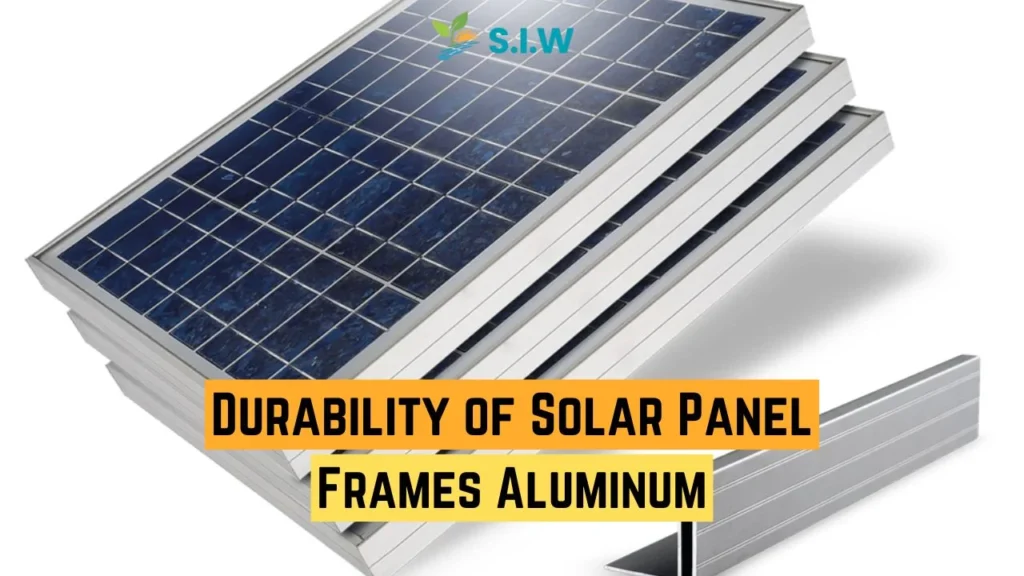As the demand for renewable energy sources continues to rise, solar energy has become a popular choice for both residential and commercial applications. A critical component of solar energy systems is the solar panel frame, which plays a vital role in supporting and protecting the solar panels. When it comes to durability, aluminum has emerged as the go-to material for solar panel frames. In this article, we will explore the durability of solar panel frames made from aluminum, discussing their advantages and why they are an excellent choice for long-term solar energy solutions.
1. Understanding Solar Panel Frames
What are Solar Panel Frames?
Solar panel frames are the structural components that support solar panels and protect them from environmental factors. They are designed to provide stability and durability, ensuring that solar panels remain securely mounted throughout their lifespan. Frames are typically made from various materials, with aluminum being one of the most popular choices due to its strength, lightweight nature, and corrosion resistance.
Materials Used in Solar Panel Frames
Several materials can be used for solar panel frames, including aluminum, steel, and plastic. Each material has its own set of advantages and disadvantages:
- Aluminum: Lightweight, corrosion-resistant, and strong, making it ideal for solar panel frames.
- Steel: Heavier and more robust but susceptible to rust and corrosion if not properly treated.
- Plastic: Lightweight and resistant to corrosion but may lack the strength and durability needed for long-term use.
2. Why Aluminum?
Properties of Aluminum
Aluminum is renowned for its impressive properties, making it an excellent choice for solar panel frames.
- Lightweight yet Strong: Aluminum frames are significantly lighter than steel, making installation easier and reducing the structural load on rooftops or mounting systems. Despite being lightweight, aluminum possesses high tensile strength, providing robust support for solar panels.
- Corrosion Resistance: One of aluminum’s standout features is its natural corrosion resistance. Unlike steel, which can rust when exposed to moisture, aluminum forms a protective oxide layer that shields it from environmental elements.
- Thermal Conductivity: Aluminum has excellent thermal conductivity, allowing it to dissipate heat effectively. This property helps to keep solar panels operating at optimal temperatures, enhancing their overall efficiency.
Benefits of Aluminum Frames for Solar Panels
- Enhanced Durability: Aluminum frames are designed to withstand harsh environmental conditions, ensuring that they do not easily warp or degrade over time. This durability is crucial for maintaining the performance of solar panels over their lifespan.
- Low Maintenance Requirements: Due to their corrosion resistance, aluminum frames require minimal maintenance compared to other materials. Regular inspections and occasional cleaning are typically all that’s needed to keep them in good condition.
- Improved Efficiency Through Heat Dissipation: The thermal conductivity of aluminum not only improves durability but also enhances solar panel efficiency. By dissipating heat effectively, aluminum frames help to maintain optimal operating temperatures for the solar cells, maximizing energy output.
3. Durability Factors of Aluminum Solar Panel Frames
Weather Resistance
Aluminum frames are built to endure various weather conditions, from extreme heat to heavy snowfall. Their robust design ensures they can withstand high winds, rain, and snow loads without compromising structural integrity. The corrosion-resistant properties of aluminum also mean that frames will not degrade when exposed to moisture or harsh weather.
- Performance Under Extreme Weather Conditions: Many studies have demonstrated that aluminum frames maintain their shape and strength under extreme weather conditions. For instance, they can handle heavy snow loads in winter and resist the damaging effects of UV rays during the summer months.
Longevity
The typical lifespan of aluminum frames in solar applications is impressive, often exceeding 25 years with proper care. This longevity is significantly higher than that of frames made from less durable materials.
- Comparison with Other Materials: When comparing aluminum frames to steel or plastic alternatives, aluminum consistently outperforms them in terms of lifespan and durability. While steel may provide strength, it requires regular maintenance to prevent rust, and plastic may not withstand long-term exposure to UV light and temperature fluctuations.
4. Maintenance and Care
Maintenance Tips for Aluminum Frames
While aluminum frames require less maintenance than other materials, regular checks and cleaning are still essential to ensure optimal performance:
- Regular Inspections: Periodically inspect the frames for any signs of wear, such as scratches or loose fasteners. Addressing minor issues promptly can prevent larger problems down the line.
- Cleaning Techniques: Cleaning aluminum frames with a gentle soap solution and a soft cloth can help remove dirt and debris. Avoid abrasive materials that could scratch the surface.
Cost-Effectiveness
Investing in aluminum frames for solar panels may involve a higher initial cost compared to other materials. However, the long-term benefits outweigh the upfront investment.
- Long-Term Savings: The durability and low maintenance requirements of aluminum frames contribute to long-term savings. Fewer repairs and replacements mean lower overall costs over the lifespan of the solar energy system.
- Initial Cost vs. Long-Term Benefits: While aluminum frames may be pricier initially, their longevity and performance make them a wise investment for anyone looking to install solar panels.
5. Real-world Applications
Case Studies of Aluminum Frame Solar Panels
Several case studies highlight the effectiveness of aluminum frames in real-world solar installations:
- Residential Installations: Many homeowners have opted for aluminum-framed solar panels due to their durability and performance. For instance, a case study in California showed that aluminum frames held up remarkably well during heavy storms, with no reported damage to the panels or frames.
- Commercial Installations: Businesses have also embraced aluminum frames for their solar systems. A notable example is a large retail chain that installed solar panels with aluminum frames on their rooftops. The frames successfully endured extreme weather conditions, leading to increased energy production and reduced energy costs.








